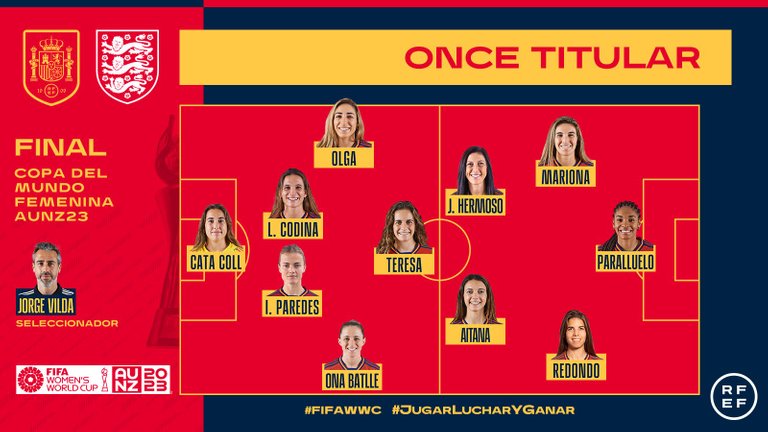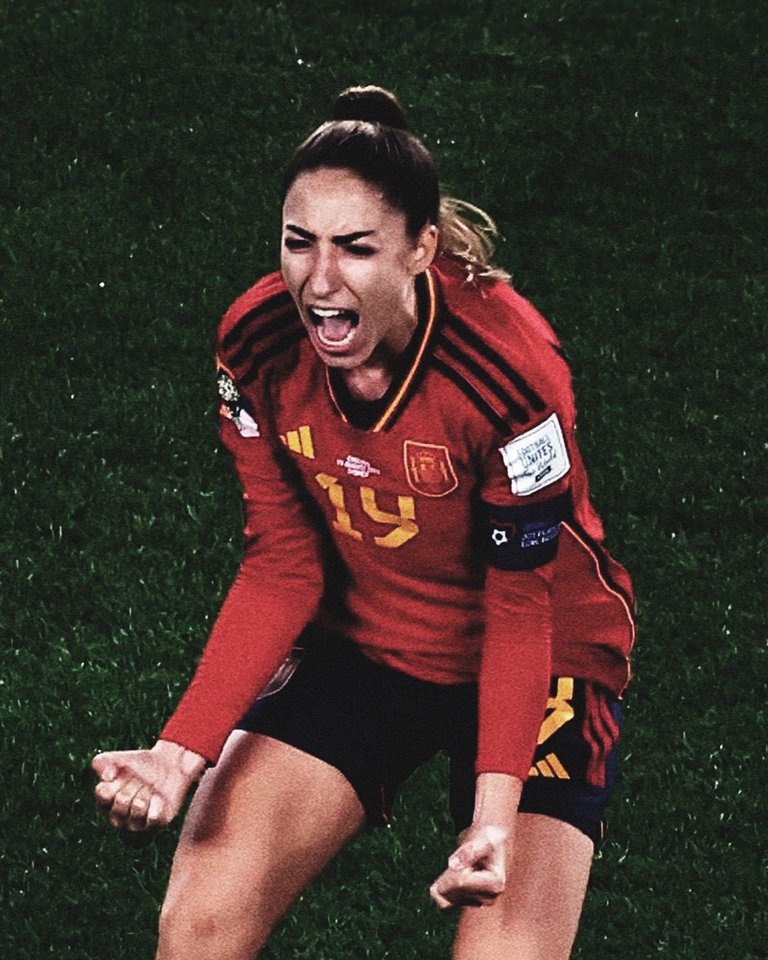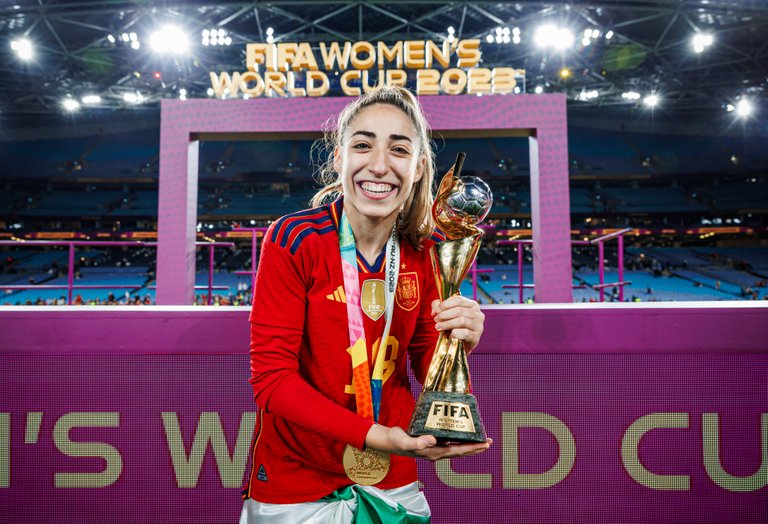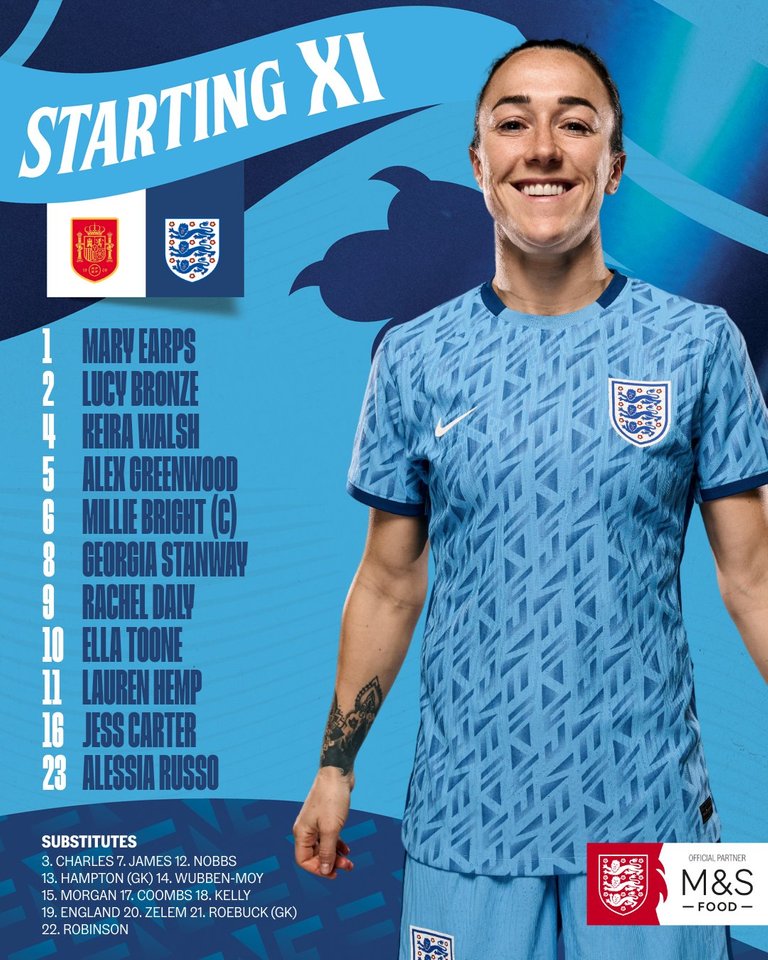[ESP/ENG] España gana la Copa del Mundo de Fútbol Femenino
Desde mis modestos conocimientos pude ver una competencia especial, madura y diferente porque no sólo vimos a los equipos que antaño tenían serios problemas técnicos y la táctica futbolística brillaba por su ausencia. Ahora vimos muchos equipos que han avanzado y la eliminación de los favoritos al trono o los antiguos equipos campeones del mundo es una evidencia de ello.
Y, dentro de los elementos que quiero señalar de este mundial está el hecho de ser el primero que se jugó con 32 equipos, mismo formato que los hombres, todos los equipos mostraron avances, con destaque para Colombia y Jamaica de nuestra área geográfica y que lamentablemente tuvieron que jugar entre ellas los Octavos de Finales. De igual manera me gustó que hubiese un nuevo equipo campeón del mundo para demostrar al resto de las selecciones que sí pueden alcanzar este objetivo.
De ese equipo y su victoria final queremos hablar en esta publicación dedicada a todas las mujeres que amamos el fútbol.
A diferencia de los pronósticos que di en semifinales y no se cumplieron aquí si acerté porque di a España como favorita al título y cumplió. Y, no es que yo sea adivina ni nada por el estilo, sencillamente lo mostrado por el conjunto ibérico a lo largo del torneo y su progresión en el mismo hacían presagiar ese resultado, que por demás fue muy engañoso porque si usted no vio el partido puede llevarse una versión equivocada de lo ocurrido porque el 1 por 0 no reflejó el dominio de las españolas contra las inglesas.
Debo decir que lo primero que me gustó de la final fue que el técnico español Jorge Vilda puso a sus mejores jugadoras del momento y no a las establecidas. En tal sentido, Salma Paralluelo abrió por encima de Alexia Putellas jugadora histórica de esta selección.
Esta fue la alineación que llevó cada técnico a la cancha del estadio australiano:
La Roja Española: Cata Col; Ona Battle, Irene Paredes, Laia Codina y Olga Carmona; Teresa Abelleira, Jenni Hermoso y Aitana Bonmatí; Mariona Caldentey, Salma Paralluelo y Alba Redondo
Las Leonas Inglesas: Mary Earps; Lucy Bronze, Millie Bright, Alex Greenwood, Jess Carter y Rachel Daly; Keira Walsh, Georgia Stanway y Ella Toone; Alessia Russo, Lauren Hemp.
Hacienda un análisis del partido hay que decir que de manera general España dominó, ganó el primer tiempo con absoluta seguridad. Su juego de toque, el dominio en el medio campo y la mejor visión general les permitió adelantarse en el minuto 28 de juego.
Sin embargo, en el minuto 15 Inglaterra tuvo una oportunidad inmejorable que no supo aprovechar, cuando en una jugada colectiva Lauren Hemp estrelló un remate de zurda en el travesaño de la portería. Esto es fatal porque cuando un equipo te está dominando y tienes una oportunidad y no la aprovechas en la próxima ellos te hacen daño.
Hay que decir que en ese primer tiempo la capitana Olga Carmona supo guiar a su equipo y ejerció su liderazgo con el gol que a la postre les daría la victoria. De igual manera reconocer el trabajo de construcción y guía certera del equipo español por intermedio de su jugadora Aitana Bonmati que supo conducir el centro del campo y toda la arquitectura española lo que le valió la condición de Balón de Oro del torneo.
En el segundo tiempo Inglaterra mejoró su juego colectivo, pero no encontró las maneras para empatar el partido. Incluso, en el minuto 70 España pudo sentenciar el partido, pero Jenni Hermoso vio como la portera y mejor jugadora de las Leonas le impidió que la pizarra se ampliara y el equipo inglés siguiera soñando con empatar y llevar el partido a la discusión por los penales.
Los 13 minutos agregados al partido no fueron suficientes e Inglaterra vio como España se coronaba tras el pitazo final de la árbitra que condujo los destinos del partido final.
Al final, España dominó en todos los aspectos del juego y si la ventaja no fue mayor se debió a la magistral actuación de su portera Mary Earps quien fuera autora de espectaculares paradas de las jugadoras rivales.
Tras la conclusión del partido y la coronación de España, esta nación se convierte en la segunda que logra que sus dos selecciones tengan un título mundial y, en el caso del femenino ostentan todos los títulos de la Federación Internacional de Asociaciones de Fútbol al ser campeonas del mundo de las categorías sub-17, sub-20 y mayores.
Utilicé para la traducción el DeepL Translate.
ENGLISH
The Women's Soccer World Cup has concluded and for lovers of sport in general and women's soccer in particular, we have enjoyed a necessary and special event, especially after the hard years we went through after the Covid-19 pandemic that caused so much tragedy to the planet.
From my modest knowledge I was able to see a special, mature and different competition because we did not only see the teams that once had serious technical problems and soccer tactics were conspicuous by their absence. Now we saw many teams that have advanced and the elimination of the favorites for the throne or the former world champion teams is evidence of this.
And, among the elements that I would like to point out about this World Cup is the fact that it was the first to be played with 32 teams, the same format as the men's, all the teams showed progress, with Colombia and Jamaica from our geographical area standing out, and unfortunately they had to play against each other in the Round of 16. I also liked the fact that there was a new world champion team to show the rest of the teams that they can achieve this goal.
We want to talk about that team and their final victory in this publication dedicated to all women who love soccer.
Unlike the predictions I made in the semifinals that did not come true, here I was right because I gave Spain as the favorite to win the title and they did. And, it is not that I am a fortune teller or anything like that, simply the Iberian team's performance throughout the tournament and its progression in the same presaged this result, which was also very misleading because if you did not see the game you may get a wrong version of what happened because the 1-0 did not reflect the dominance of the Spanish against the English.
I must say that the first thing I liked about the final was that Spanish coach Jorge Vilda used his best players of the moment and not the established ones. In that sense, Salma Paralluelo opened above Alexia Putellas, a historical player of this national team.
This was the lineup that each coach took to the field of the Australian stadium:

the red
La Roja Española: Cata Col; Ona Battle, Irene Paredes, Laia Codina and Olga Carmona; Teresa Abelleira, Jenni Hermoso and Aitana Bonmatí; Mariona Caldentey, Salma Paralluelo and Alba Redondo.
The English Lionesses: Mary Earps; Lucy Bronze, Millie Bright, Alex Greenwood, Jess Carter and Rachel Daly; Keira Walsh, Georgia Stanway and Ella Toone; Alessia Russo, Lauren Hemp.
In terms of match analysis, Spain dominated overall, winning the first half with absolute certainty. Their touch game, dominance in midfield and better overall vision allowed them to take the lead in the 28th minute of play.
However, in the 15th minute England had an unbeatable opportunity that they failed to take advantage of, when in a collective play Lauren Hemp crashed a left-footed shot into the crossbar of the goal. This is fatal because when a team is dominating you and you have a chance and you don't take it the next time they hurt you.

captain
It must be said that in that first half, captain Olga Carmona was able to lead her team and she exercised her leadership with the goal that would eventually give them the victory. Likewise, we must recognize the construction work and accurate guidance of the Spanish team through their player Aitana Bonmati, who was able to lead the midfield and the entire Spanish architecture, which earned her the status of Golden Ball of the tournament.
In the second half England improved their collective play, but could not find a way to tie the match. Even in the 70th minute, Spain could have won the match, but Jenni Hermoso saw how the goalkeeper and best player of the Lionesses prevented her from extending the scoreboard and the English team continued dreaming of tying and taking the match to a penalty shootout.
The 13 minutes added to the match were not enough and England saw how Spain was crowned after the final whistle of the referee who led the destiny of the final match.
In the end, Spain dominated in all aspects of the game and if the advantage was not greater it was due to the masterful performance of their goalkeeper Mary Earps who was the author of spectacular saves from the rival players.
After the conclusion of the match and the coronation of Spain, this nation becomes the second to have both its national teams win a world title and, in the case of the women's team, they hold all the titles of the International Federation of Football Associations as world champions in the U-17, U-20 and senior categories.
I used DeepL Translate for the translation.




@estelacha
https://leofinance.io/threads/view/fulldeportes1/re-leothreads-2r4qkcatd
Congratulations @estelacha! You have completed the following achievement on the Hive blockchain And have been rewarded with New badge(s)
Your next target is to reach 3250 upvotes.
You can view your badges on your board and compare yourself to others in the Ranking
If you no longer want to receive notifications, reply to this comment with the word
STOPCheck out our last posts: